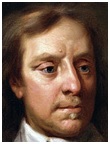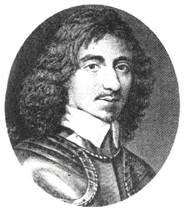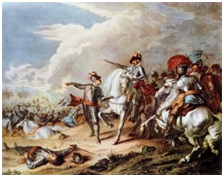|
 |
|
 |
|
|
||
Oliver Cromwell Leadership
Oliver Cromwell (1599-1658) Jointly led the Parliamentary forces (called Roundheads because of their short haircut) against King Charles I in the English Civil War and defeated him. Cromwell (pictured right) abolished the monarchy after Charles’s execution in 1649 and became Lord Protector in 1653. His support of the Puritan (or Calvinist) religion had a big influence in Britain and America.
Cromwell is also famous for... The phrase warts and all (i.e. show bad and good points) He allegedly said this to his portrait painter, Peter Lely
Why was he a great leader?
1. Inspired great people How?
a) selection and discipline He picked troops for his New Model army who had integrity and strong religious beliefs. This made them highly disciplined and devoted to him, despite his strictness. They were fined for swearing and put in stocks for drunkenness.
b) good relationships with his men He was able to:
He refused to become king, because he knew it would offend some of his old army colleagues. He knew and loved his troops, and they loved him in return.
c) humour and humility He had a great sense of humour and was never boastful or arrogant. In the Civil War, he wasn’t angry with his guards when they took a long time to check his identity. Instead he gave them money for doing their duty!
2. Integrity He had great goodness and humility, giving credit to God and his men for his victories and being happy to serve as the deputy of Sir Thomas Fairfax (pictured right) in the Civil War. Cromwell could be vengeful with a terrible temper (see point 4), but he usually had great self-control. His actions were always guided by his conscience and what he thought was right. During the Civil War, he was driven by his motto, “to seek peace through war”.
3. Purpose and Christian belief His aim was always to serve God and the English people, particularly their spiritual welfare. He gained great resolution and purpose from his Puritan religion. Before his evangelical conversion around 1630, he suffered from depression, self-doubt and indecision.
4. Tough but tender He could be ruthless ,as he showed in:
But he was also a kind man who cared for ordinary people and the weak. He passionately believed in religious toleration, re-admitting the Jews into England, and improving the treatment of Roman Catholics. 5. Machiavellian Despite his high principles, he sometimes adopted Machiavelli’s (pictured right) idea that the means (however bad) justified the ends (his aims). He could be dishonest, if he needed to be, and he used dictatorial powers, which he had fought to take away from the King. This may have been hypocritical, but was extremely effective.
6. Action and inaction He was decisive in war, brilliantly using the cavalry charge (as at the Battle of Naseby in 1645, pictured right), because he was certain of God’s support. He led by example, fighting bravely and leading cavalry charges. But in peacetime, decisiveness (e.g. dissolving Parliament and becoming Lord Protector in 1653) was mixed with inaction, because he wasn’t clear about the right thing to do. He was indecisive over Charles’s execution. “The man of action proved to be at the mercy of introspection” , his biographer, Antonia Fraser, said.
7. Conservative revolutionary As a soldier and a young MP, he was a revolutionary, challenging the King’s power. But, as Lord Protector, he learned that stability and the status quo are also important to keep law and order. For example, he refused to:
8. Learning and listening He was not an intellectual, but he did think deeply about his decisions, drawing wisdom from books (particularly the Bible) and people. He managed to draw out other people’s views and act upon their good advice. He learned the importance of cavalry from his defeat at the Battle of Edgehill in 1642.
9. Relaxation and reflection He loved his family (including six children), music, horse riding, hunting and hawking. These interests reduced stress and gave him time to reflect on the best thing to do.
10. Support He was supported by his beloved wife, Elizabeth (pictured right), a spirited lady, who was not afraid to tell him that he had done something wrong. Her selfless devotion to their family and home enabled him to concentrate on his work without distractions or irritations.
Key quote on relationships “I beseech you, in the bowels of Christ, think it possible you may be mistaken” (in a letter to the Church of Scotland’s General Assembly, quoted by Jacob Bronowski (pictured right) at Auschwitz in his TV programme, The Ascent of Man).
Key quotes on selection A few honest men are better than numbers. I would rather have a plain, russet-coated captain that knows what he fights for, and loves what he knows, than which you call ‘a gentleman’ and is nothing else. The state, in choosing men to serve it, takes no notice of their opinions. If they be willing to serve it, that satisfies
Key quote on decision making Cruel necessity (on King Charles I’s execution). |
|
|
||
|
|
||
| Copyright © wisdomtowin.com 2025 All Rights Reserved | ||
|









